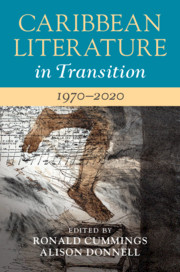Book contents
- Caribbean Literature in Transition, 1970–2020
- Caribbean Literature in Transition
- Caribbean Literature in Transition, 1970–2020
- Copyright page
- Contents
- List of Illustrations
- Contributors
- Acknowledgements
- Introduction: Caribbean Assemblages, 1970s–2020
- Part I Literary and Generic Transitions
- Chapter 1 Writing and the Responsibility to Memory: The Role of White Female Planters in Contemporary Caribbean Novels
- Chapter 2 Caribbean Identities and Diversifying the Creole Mix
- Chapter 3 Carnival, Calypso and Dancehall Cultures: Making the Popular Political in Contemporary Caribbean Writing
- Chapter 4 Life Writing, Gender and Caribbean Narrative 1970–2015: Itinerant Self-Making in the Postcolonial Caribbean
- Chapter 5 Forwarding Dubpoetry in this Generation: A Grassroots Performance and Neo-Literary Genre in Transition
- Chapter 6 Postcolonial Ruins, Reconstructive Poetics: Caribbean Urban Imaginaries
- Chapter 7 Reimagining Caribbean Time and Space: Speculative Fiction
- Chapter 8 Caribbean Drama and Performance
- Chapter 9 Here Are the Others: Caribbean Creative Nonfiction
- Chapter 10 ‘Let Every Child Run Wild’: Cultural Identity and the Role of the Child in Caribbean Children’s and Young Adult Fiction
- Part II Cultural and Political Transitions
- Part III The Caribbean Region in Transition
- Part IV Critical Transitions
- Bibliography
- Index
Chapter 10 - ‘Let Every Child Run Wild’: Cultural Identity and the Role of the Child in Caribbean Children’s and Young Adult Fiction
from Part I - Literary and Generic Transitions
Published online by Cambridge University Press: 16 December 2020
- Caribbean Literature in Transition, 1970–2020
- Caribbean Literature in Transition
- Caribbean Literature in Transition, 1970–2020
- Copyright page
- Contents
- List of Illustrations
- Contributors
- Acknowledgements
- Introduction: Caribbean Assemblages, 1970s–2020
- Part I Literary and Generic Transitions
- Chapter 1 Writing and the Responsibility to Memory: The Role of White Female Planters in Contemporary Caribbean Novels
- Chapter 2 Caribbean Identities and Diversifying the Creole Mix
- Chapter 3 Carnival, Calypso and Dancehall Cultures: Making the Popular Political in Contemporary Caribbean Writing
- Chapter 4 Life Writing, Gender and Caribbean Narrative 1970–2015: Itinerant Self-Making in the Postcolonial Caribbean
- Chapter 5 Forwarding Dubpoetry in this Generation: A Grassroots Performance and Neo-Literary Genre in Transition
- Chapter 6 Postcolonial Ruins, Reconstructive Poetics: Caribbean Urban Imaginaries
- Chapter 7 Reimagining Caribbean Time and Space: Speculative Fiction
- Chapter 8 Caribbean Drama and Performance
- Chapter 9 Here Are the Others: Caribbean Creative Nonfiction
- Chapter 10 ‘Let Every Child Run Wild’: Cultural Identity and the Role of the Child in Caribbean Children’s and Young Adult Fiction
- Part II Cultural and Political Transitions
- Part III The Caribbean Region in Transition
- Part IV Critical Transitions
- Bibliography
- Index
Summary
Children’s and Young Adult Fiction has slowly emerged since the 1970s as a significant presence in Caribbean writing, although it still constitutes an understudied group of texts and has received comparatively little critical attention from scholars and critics. This essay explores how Caribbean Children’s and Young Adult Fiction draws on Afro- and Indo-Caribbean oral traditions and folklore whilst also exploring contemporary cultural issues such as sexuality and body-image as it approaches questions around Caribbean cultural identity with different perspectives, purposes and poetics. Collectively, these works have provided an important space through which to revisit history, either to tell stories that have been left out of the official record or to retell grand historical narratives (colonial and national) from other perspectives. The presence and centrality of child narrators has been a marked feature, and their voices are frequently deployed to critique and provide fresh commentary on established narratives, historical reasonings and social questions.
Keywords
- Type
- Chapter
- Information
- Caribbean Literature in Transition, 1970–2020 , pp. 164 - 180Publisher: Cambridge University PressPrint publication year: 2021

